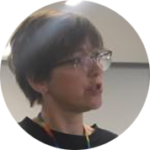Knowing Better in Religious Education
November 2022
Dr Jo Fraser-Pearce and Alexis Stones
Religious Education (RE) is by nature interdisciplinary and therefore has a distinctive contribution to make to the development of epistemic literacy in students. We define ‘epistemic literacy’ as:
Competency and proficiency in the identification, interpretation, understanding, questioning, navigation, application and communication of knowledge.
Our shorthand is “knowing well”.
In the first audio PowerPoint we introduce our research with an overview of a previous project that led us to explore the role of knowledge in RE. The idea of epistemic literacy emerged as a response to our observation of students’ confusion around the different types of knowledge in the RE curriculum. When opinion was confused with knowing something, a culture of respect inhibited challenge and criticality, resulting in the epistemic ‘haves’ and ‘have nots’.

 Alexis Stones is subject lead for the PGCE Religious Education at UCL Institute of Education. She has worked for many years as an RE teacher with research activities in knowledge and subject specialisms, religion and science, sacred art and peace education. She is also a museum educator and lecturer for ITE at the National Gallery, London.
Alexis Stones is subject lead for the PGCE Religious Education at UCL Institute of Education. She has worked for many years as an RE teacher with research activities in knowledge and subject specialisms, religion and science, sacred art and peace education. She is also a museum educator and lecturer for ITE at the National Gallery, London.